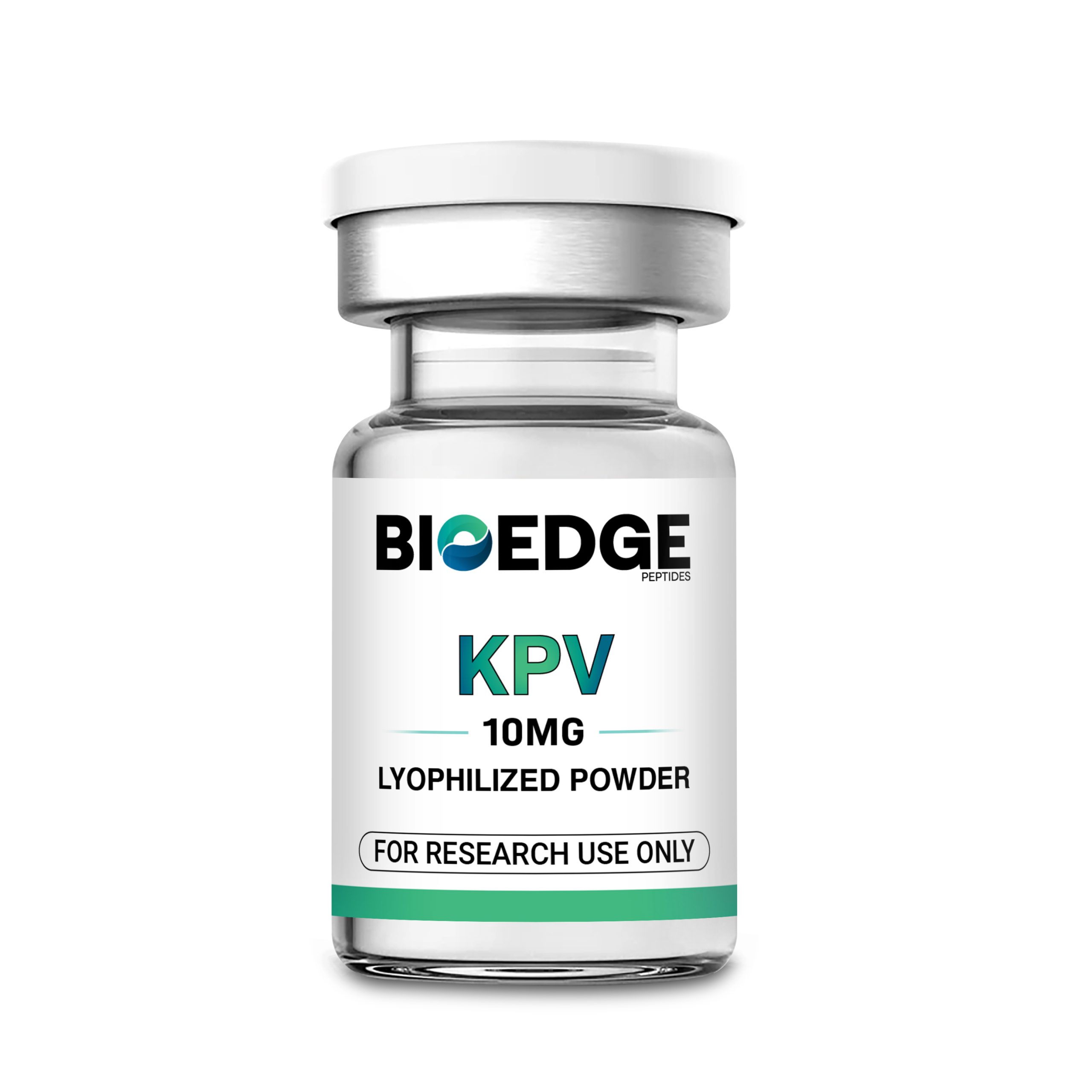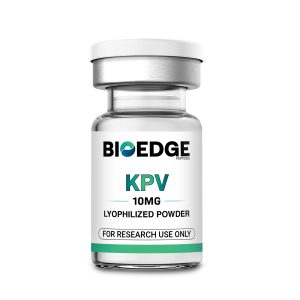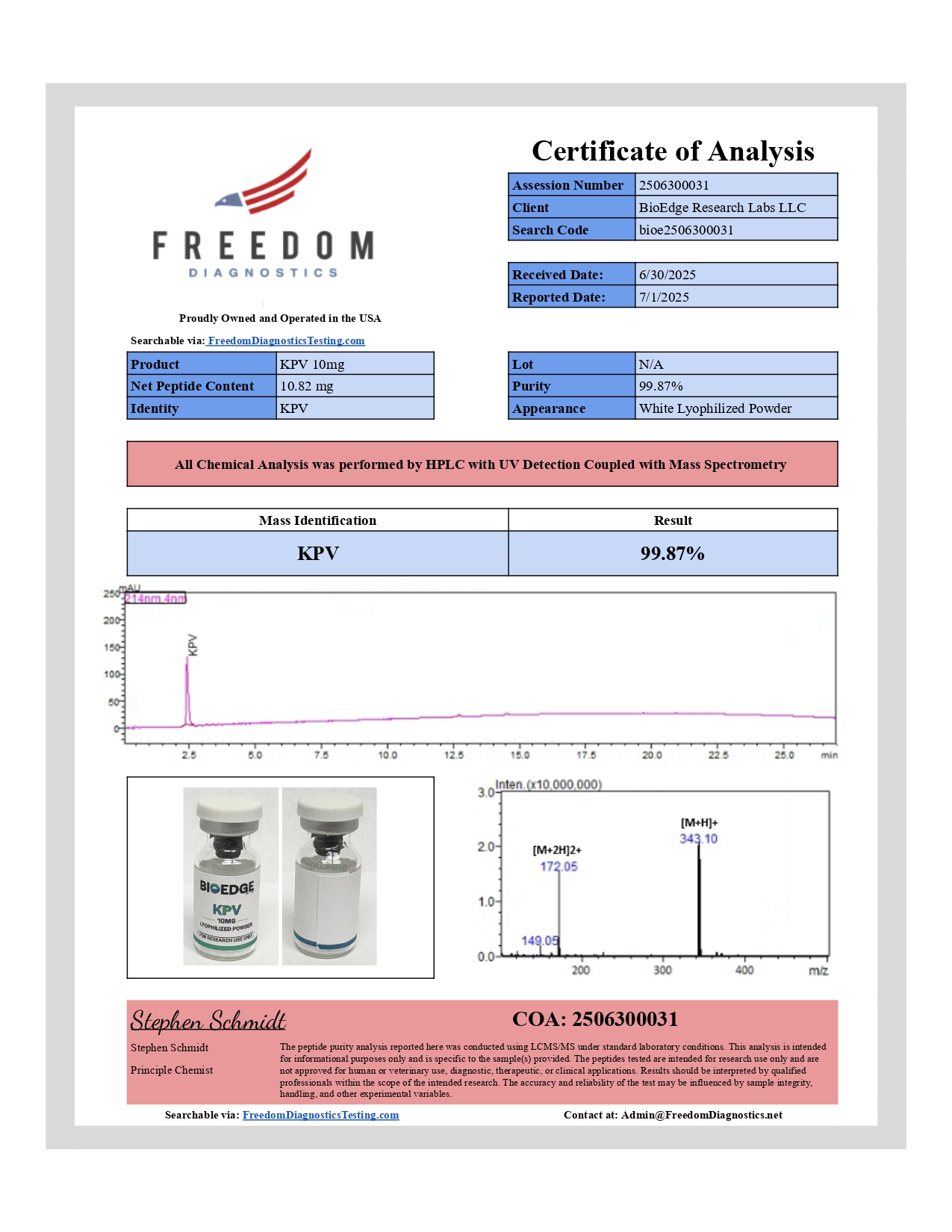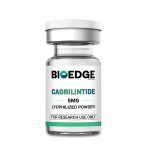

KPV (10mg)
$76.00 Original price was: $76.00.$68.00Current price is: $68.00.
Contents: Lyophilized Powder in 3ml vial
Requires reconstitution with bacteriostatic water
Rigorous Third-Party Testing
Every batch of our research chemicals and peptides undergoes third-party testing.
- Description
- 3rd Party Lab Testing
Description
What is KPV?
KPV is a synthetic tripeptide fragment (Lysine-Proline-Valine) derived from alpha-MSH, studied for its potential role in supporting inflammation control, gut lining repair, and immune system regulation. In preclinical models, KPV has shown promise in reducing inflammation, aiding wound healing, and protecting mucosal tissue from damage. It’s being explored in lab environments for its antimicrobial properties and its ability to maintain the integrity of the epithelial barrier — especially in the gut and skin.
KPV Product Specifications
| Specification | Details |
|---|---|
| Product | KPV |
| Purity | >99% (HPLC Verified) |
| Form | White Lyophilized Powder |
| Solubility | Soluble in sterile water |
| Storage Conditions | Store in a cool, dry place; refrigerate after reconstitution |
| Stability | 24 months when properly stored |
Why Choose BioEdge Research Labs KPV?
Research Grade Purity: Verified purity >99% by third-party HPLC analysis.
Secure Packaging: Designed to maintain peptide stability and prevent degradation during shipment and storage.
Rapid Fulfillment: Most orders ship within 24 hours of payment confirmation from our U.S.-based facility.
Researcher Support: Expert customer service tailored to licensed research professionals.
Summary of Preclinical Research Findings
Inflammation and Immune Modulation
KPV has demonstrated strong anti-inflammatory activity in laboratory models, including the suppression of pro-inflammatory cytokines and NF-κB signaling. Studies show its potential to calm immune overactivity and support recovery from inflammatory injury.
Gut Lining Repair and Barrier Protection
In colitis and intestinal injury models, KPV appears to strengthen the epithelial barrier, reduce intestinal permeability, and promote healing of damaged gut tissue. Research also indicates its ability to regulate tight junction proteins, which are vital for barrier integrity.
Wound Healing and Skin Health
Topical and systemic applications of KPV have been explored in skin injury models. Results suggest that it may support faster wound healing, reduce local inflammation, and minimize tissue scarring.
Antimicrobial and Mucosal Defense
KPV has shown antimicrobial activity against specific bacteria in lab studies. It may help maintain a healthier microbial balance, especially in mucosal tissues such as the intestines and skin.
Suggested Areas of Research
-
Inflammation modulation
-
Intestinal barrier integrity
-
Immune response regulation
-
Skin and epithelial tissue healing
-
Antimicrobial activity in mucosal environments
-
Wound and injury recovery
Handling & Storage Guidelines
-
Reconstitute with sterile water for lab use
-
Store lyophilized peptide in a cool, dry place
-
After reconstitution, refrigerate and use within 30 days
-
Avoid repeated freeze-thaw cycles
For Research Use Only
BioEdge Research Labs’ BPC-157 is intended strictly for scientific laboratory research.
- Not for human or animal consumption.
- Not for diagnostic, therapeutic, or clinical use.
- Not for resale or any use outside of approved laboratory settings.
Summary of References
KPV in Gut Repair and Colitis Models
-
Ghosh, S.S., et al. (2007). Peptide KPV inhibits inflammation and apoptosis in murine colitis. Gastroenterology, 132(2), 502–515. https://www.sciencedirect.com/science/article/pii/S0016508507018525
-
Ashburn, J.H., et al. (2008). Inhibition of NF-κB by KPV reduces epithelial barrier dysfunction. Inflammatory Bowel Diseases, 14(3), 324–332. https://academic.oup.com/ibdjournal/article-abstract/14/3/324/4653598
-
Zhang, H., et al. (2024). KPV mitigates inflammation and restores intestinal integrity in IBD models. Journal of Hepatology, 2024(07), 075. https://link.springer.com/article/10.1007/JHEP07(2024)075
KPV in Skin and Wound Healing
-
Lee, Y.J., et al. (2015). KPV reduces cytokine activity and supports re-epithelialization in wounded skin. Journal of Investigative Dermatology, 135(10), 2503–2512. https://www.sciencedirect.com/science/article/pii/S0022202X15307697
-
Ward, D.B., et al. (2022). Healing effects of KPV-loaded hydrogels on burn wounds. Regenerative Therapy, 21, 124–133. https://www.sciencedirect.com/science/article/pii/S174270612200126X
KPV and Mucosal/Epithelial Integrity
-
Yin, Y., et al. (2022). Antimicrobial peptide hydrogels containing KPV enhance mucosal healing. Biomaterials Science, 10(2), 403–417. https://pubs.rsc.org/en/content/articlehtml/2022/bm/d1bm01466h
-
Zhao, L., et al. (2024). KPV promotes tight junction formation in epithelial models. Journal of Surgical Research, 295, 123–133. https://www.sciencedirect.com/science/article/pii/S0022356524308468
KPV in Immune Modulation
-
Zhao, H., et al. (2005). Regulatory effects of KPV on cytokine signaling and leukocyte migration. Journal of Immunological Methods, 306(1–2), 63–71. https://www.sciencedirect.com/science/article/pii/S0022480405004555
-
Liang, M., et al. (2024). Immunomodulatory role of KPV in inflamed tissue environments. Advanced Healthcare Materials, 13(3), 202402320. https://onlinelibrary.wiley.com/doi/abs/10.1002/adhm.202402320
BioEdge Research Labs
Precision. Purity. Performance.
At BioEdge, we are committed to providing research professionals with the highest quality peptides on the market. Every compound we supply is manufactured in a cGMP-certified facility, undergoes rigorous third-party testing, and is intended strictly for in vitro or laboratory research use only.






